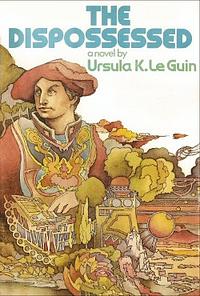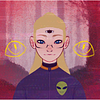Take a photo of a barcode or cover
adventurous
challenging
hopeful
inspiring
reflective
medium-paced
reflective
hopeful
inspiring
reflective
medium-paced
Plot or Character Driven:
A mix
Strong character development:
Yes
Loveable characters:
Yes
Diverse cast of characters:
Yes
Flaws of characters a main focus:
No
A beautiful reflection of how we should be caring for one another.
adventurous
challenging
emotional
hopeful
slow-paced
Plot or Character Driven:
Character
Strong character development:
Yes
Loveable characters:
Yes
Diverse cast of characters:
Yes
Flaws of characters a main focus:
Yes
Oh Ms LeGuin you’ve done it again, constantly raising the bar for us all and doing it flawlessly. The jumping between Anarres and Urras to mirror the issues in both societies, pointing out personal flaws will always cause tension no matter how much or little structure your culture has. Then using the other alien species to balance out the detest readers have for Urras. We are doomed to repeat cycles and take our stations for granted.
Only reason it’s not five stars is that the final quarter of the book feels rushed in comparison to the first three quarters.I wish we were given more time with Urrasti poor, lower class, wanna be anarchists. I think exploring their relationship to a planet they idolize and Shevek’s lived experience would’ve been interesting. Also losing points for the unnecessary sexual assault Shevek commits, which he then breezes past and feels no guilt for. While I understand why it’s there, showcasing the corruption capitalism instills in all of its victims, it didn’t feel dealt with properly. There was no reference on Shevek’s side.
Only reason it’s not five stars is that the final quarter of the book feels rushed in comparison to the first three quarters.
Graphic: Sexism, Sexual assault, Forced institutionalization, Police brutality
Famine
Le Guin’s writing is so detailed that I forgot I was reading about made up, alien planets set thousands of years in the future. I thought the depiction of an anarchist utopia with its realistic benefits and drawbacks was very well done. Those flaws made it feel more realistic vs. other stories where the utopias are completely perfect and the dystopias are completely awful.
In addition to the big picture themes, there were also so many smaller human moments in this story that Le Guin portrayed so vividly - I kept thinking about them days after I’d finished with the book. This is the type of sci-fi that has an incredibly imaginative premise but it also is easy to connect to as a human living on earth in present times.
The protagonist was quite flawed but reading through his experiences both on his own planet and an alien planet was quite enjoyable. Also enjoyed the way the differences between the two planets were portrayed, even down to the words they used to describe things. Overall beautifully written and now one of my favorite sci-fi.
In addition to the big picture themes, there were also so many smaller human moments in this story that Le Guin portrayed so vividly - I kept thinking about them days after I’d finished with the book. This is the type of sci-fi that has an incredibly imaginative premise but it also is easy to connect to as a human living on earth in present times.
The protagonist was quite flawed but reading through his experiences both on his own planet and an alien planet was quite enjoyable. Also enjoyed the way the differences between the two planets were portrayed, even down to the words they used to describe things. Overall beautifully written and now one of my favorite sci-fi.
challenging
reflective
medium-paced
Plot or Character Driven:
Character
Strong character development:
Yes
Loveable characters:
Complicated
Diverse cast of characters:
Yes
Flaws of characters a main focus:
N/A
adventurous
challenging
dark
emotional
inspiring
mysterious
tense
slow-paced
Plot or Character Driven:
A mix
Strong character development:
Complicated
Loveable characters:
Complicated
Diverse cast of characters:
Complicated
Flaws of characters a main focus:
Yes
I knew this book was going to hit hard from the opening paragraph, and it did not disappoint. I've enjoyed Ursula Le Guin's work before--The Left Hand of Darkness is one of my favorite books—and I absolutely see why The Dispossessed is considered one of her crowning pieces. The setting for this book is a planet and its moon—Urras, the planet, is a lush world not dissimilar from Earth, which is home to several capitalist countries and at least one socialist country; and Anarres, the moon, which is a dusty, resource-scanty place home to a society of anarchists who fled from Urras just under two hundred years ago. The core of the novel concerns Shevek, a theoretical physicist from Anarres who chooses to relocate to Urras.
Le Guin captures truly great sci-fi because this work is so imbued with curiosity. Le Guin is asking questions at the heart of any great sci-fi work: What defines humanity? What can we achieve, and how is it done, and what does that mean for society? What is society? What does it mean to be alone? What does it mean to be part of a whole? To me, sci-fi can't be truly sci-fi without a measure of philosophy, and The Dispossessed has this in droves.
Not that Le Guin is necessarily positing answers. Even if you haven't read her quote about the specious inevitability of capitalism, you can tell she has opinions on it, but she doesn't fall into the trap of making her anarchist world a utopian solution to all problems of capitalism. There are problems on Anarres too—resources are scarce and life can be very uncomfortable; Shevek often feels stifled because, as his work is understood by so few people, there is broad disinterest in supporting him as his fellows cannot see why what he's doing matters; many of the same petty rivalries and jealousies that exist among us exist also among the Anarresti; and even in this extraordinarily decentralized society, there are still individuals seeking to accumulate whatever power they can.
Yet this is also true: the Anarresti conceive of themselves as a whole, succeeding or failing together. There is no money. There is always a roof or a meal for someone who needs it. There is little in the way of possessiveness, as ownership is universally scorned as egoistic. There is great willingness to do whatever work is presently most needed, regardless of personal desire or interest.
It might have also been easy for this book to become nothing but a parade of Shevek being shocked at various failings of Urresti society, but Le Guin avoids this clumsy narrative. Rather, we get a nuanced and touchingly real exploration of Shevek trying to adjust to a society he has so little context for (he was born and raised on Anarres); trying to weigh what he's been told about it (the Anarresti do not think very highly of the Urresti, nor vis-versa) against what he experiences himself; struggling with who, if anyone, should have access to his work and what responsibility he has as the theorist who may enable others to put his theories into practice.
Additionally, The Dispossessed is an effort at a practical look at a functioning anarchist society. Again, Le Guin is asking questions: What might this society look like? How does it work? What are its strengths, its weaknesses? How do people fit, or not fit, into this society? What philosophies or attitudes underpin their commitment to anarchism?
There are so many quotes I was underlining as I went through this book. I can tell it, like The Left Hand of Darkness, is one I will have to re-read: it's a book that will give something new each time. The whole work is naturally a reflection on our own world, inviting us to ask these same questions which Le Guin poses about Anarres and Urras about Earth. She has a deft hand with simply showing or explaining core elements of these questions, such as in the paragraph quoted above. This small paragraph is all she needs to remind us of the power and depth of the instinct to tribalism and the weight which fear and hatred of outsiders can carry in any society.
All of her characters come off so very realistic, which helps sell the entire meditation. Shevek, his partner Takver (marriage does not exist on Anarres, though long-term monogamous partnerships are not uncommon), his friends and rivals on Anarres, as well as those who surround him on Urras, all come across with their own motivations and philosophies. There is no one who exists as a cartoonish strawman for any one view, positive or negative; they all have flaws and virtues.
Also, honestly, have to shout-out to Le Guin for writing in 1974 her "most likely heterosexual" male protagonist having gay sex with his pal just to reaffirm their friendship. Queen move.
The pace of this book is quite measured, but I enjoyed every minute I was engaged with it and I look forward to picking it up again in a few years to see what it will share with me then. Sometimes, you read a book that's gotten heavy praise and accolades and find it out that it does actually warrant the attention, and The Dispossessed absolutely warrants it.
adventurous
informative
reflective
medium-paced



